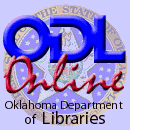

|
|
|
|
|
|
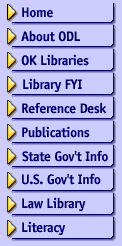
The Oklahoma Literacy Resource Office
Oklahoma
Dept. of Libraries
200 NE 18th St
Oklahoma City,
Oklahoma
73105-3298
(405) 522-3205
(405) 525-7804—FAX
Health Literacy
Background information
The degree to which individuals have the capacity to obtain, process, and understand basic health information and services needed to make appropriate health decisions. Patient Protection and Affordable Care Act of 2010, Title V
The American Medical Association Foundation has said poor health literacy is a stronger predictor of a person’s health than his age, socioeconomic status, education, or ethnicity.
According to the U.S. Department of Health and Human Services, persons with limited literacy skills are more likely to have chronic conditions such as high blood pressure, diabetes, or asthma and are less likely to manage them effectively.
The Institute for Medicine’s Board of Neuroscience and Health has found that adults need basic health literacy skills to speak with medical professionals, access health information, follow dosage instructions, make informed health decisions, and to use medical tools for personal and family health care.
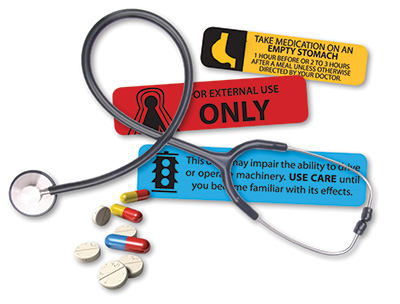
Oklahoma's Efforts
"Health information is so important and so many people don’t understand how to ask the right questions. It takes a lot of courage to tell someone you don’t know something. As long as you treat us with respect and show the right attitude, we’re not going to be offended by how many questions you have to ask us in order to help us find the information we’re looking for." —Carol, adult learner from Tulsa
In 2011, the 22nd annual America’s Health Rankings, produced by United Health Foundation, ranked Oklahoma as one of the bottom 3 least healthy states, 48th overall. This drop of two places from the previous year prompted the Oklahoma Literacy Resource Office to launch a new health literacy initiative.
Since that time, there have been significant statewide and local health and literacy partnerships, two statewide literacy summits (2012 and 2014), a new health literacy website, wide distribution of health literacy resources, and an increase in awareness of the connection between low literacy and poor health. In 2014, Oklahoma’s health ranking was 46th place, attributed in part to high rates of obesity, physical inactivity, high cholesterol, drug deaths, the lack of immunization of children, lack of primary care physicians, diabetes, lack of annual dental exams, and low consumption of fruits.
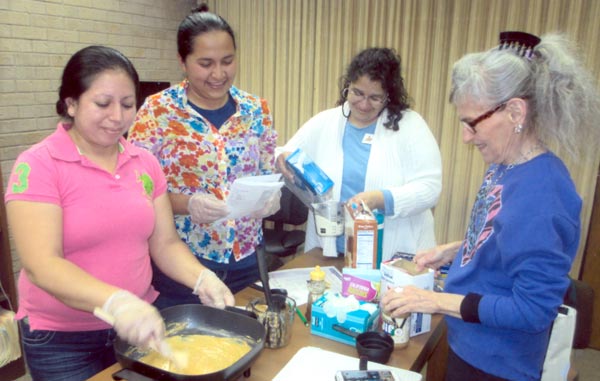 |
| Blanco Martinez and Blanco Castaneda [left two], both learners at the Great Plains Literacy Council in Altus, read the recipe and prepare No Bake Breakfast Bars during a Fresh Start health literacy cooking class. Oklahoma State University Extension Nutrition Assistant Becky Luna [second from right] oversees the activity and provides nutrition information with assistance from ASCOG Title V Literacy Assistant Judy Miller [far right], who is also a tutor for the literacy service. |
Examples of health literacy activities in Oklahoma
-
In May, 2014, Dr. Andrew Pleasant facilitated a planning meeting of health and literacy professionals before presenting at Oklahoma’s second health literacy summit."I didn’t understand the right way for my son to use his inhaler until I read the book."—adult learner, Project Read (What to do When Your Child Gets Sick)
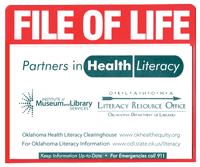
"This project gave our library a new focus based on a real community need. We have come away from this determined that providing for lifetime learning about ways to achieve healthy living will become one of our core programs."—Marcia Johnson, Miami Public Library
- The Oklahoma Health Equity Campaign, facilitated by the State Department of Health, named health literacy as a primary focus of health equity. Staff from the Oklahoma Literacy Resource Office assisted with the development of position statements to address the issue.
- The Literacy Resource Office, in collaboration with the Oklahoma Department of Health and the Aging Services Division of the State Department of Human Services, hosted Living Longer Living Stronger with Chronic Conditions community workshops throughout the state.
- More than 5,000 Files of Life, providing easy to access to important medical information, have been distributed throughout the state.
In 2014, the Literacy Resource Office awarded a second round of health literacy grants with Library Services and Technology Act funding from the Institute of Museum and Library Services. Seven pilot sites provided resources, information, and training to community members and adult learners:
- Creek County Literacy Council, Sapulpa—Offered a 12 weeks of Tai Chi Quan classes; hosted classes for the community on such topics as CPR, First Aid and Poison Control, and Fire Safety and Prevention; and networked with more than 50 organizations to promote healthy lifestyles in Creek County.
- Great Plains Literacy Council, Altus—Incorporated health literacy into tutor training including information on reliable websites and Files of Life; presented health literacy information for Jackson County Health Department nutrition (WIC) classes; and translated health literacy information for Hispanic learners and churches with Hispanic missions.
- Miami Public Library and Miami Literacy Council—Collaborated with the Northeastern Tribal Health System and INTEGRIS Baptist Regional Health Center to distribute information and provide community health workshops; presented healthy eating information to elementary school children; and added health links to website and Facebook sites.
- Moore Public Library—held Zumba classes in the library; coordinated a Healthy Cooking on a Budget demonstration at a Section-8 apartment complex; and promoted healthy hand washing techniques for children attending special story times.
- Northwest Oklahoma Literacy Council, Woodward—Incorporated health lessons in English Language classes; arranged for adult learners to tour the hospital; and participated in a Senior Center Flu Preparedness event.
- Project Read, Edmond—Developed and distributed a community social service resource list; collaborated with a local church to provide healthy eating information/activities for children living in a low income neighborhood; participated in Healthy Kids Night where health professionals were on hand to provide health screening for children and information to parents.
- Western Oklahoma Literacy Council, Elk City—developed a bilingual map of the Great Plains Regional Medical Center in Elk City; hosted a 6-part Living Longer Living Stronger with Chronic Conditions workshop; and provided mothers in the English Language class with copies of the publication What to do When Your Child Gets Sick.
In FY2015, ODL awarded $4,000 health literacy grants to eleven library and literacy sites throughout the state. Recipients were: Great Plains Literacy Council, Altus; Antlers Public Library; New Dimension Literacy Council, Ardmore; Chickasaw Regional Library System, Ardmore; Project Read, Edmond; Western Oklahoma Learning Center, Elk City; Fairview City Library; Miami Public Library Literacy Services; Moore Public Library; Creek County Literacy Program, Sapulpa; and Tahlequah Public Library.
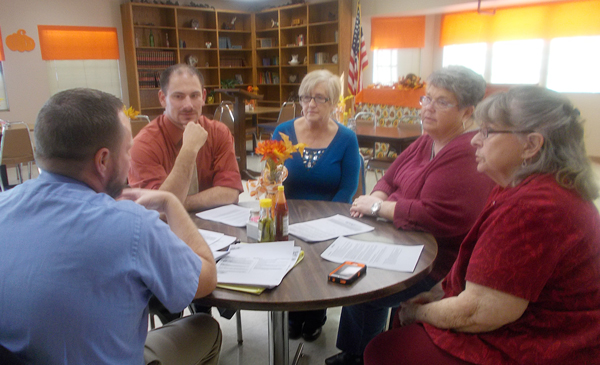 |
Western Oklahoma Learning Center (WOLC) in Elk City recently hosted a Medicare Prescription Plans/ Prescription Medications Question and Answer Forum in conjunction with the Elk City Walgreen’s Drug Store. Walgreen pharmacist Michael Womack [left] and manager Matt Wheeler came to the Elk City Meals on Wheels Dining Room to visit with the residents of Fairview Village Housing Community. Matt and Michael “worked the room,” visiting with the diners and passing out Medicare information on FAQ’s. They also answered medication questions one–on–one if requested. WOLC appreciates Walgreen’s taking the time to help the community, and we look forward to working with them again soon. • This forum was made possible in part by a grant from the Oklahoma Department of Libraries with Library Services and Technology Act funds from the Institute of Museum and Library Services (IMLS). |
Helpful Health Literacy Websites and Other Resources
Health Literacy Brochure—ODL & Oklahoma Health Literacy Clearinghouse
Plain Language Resources—National Institute for Health
Simply Put—A guide for creating easy-to-understand materials
Health Literacy Information—National Network of Libraries of Medicine
Florida Literacy Coalition—free health literacy curriculum
YouTube video featuring adults with low literacy skills, including Toni Cordell from Oklahoma (23 minutes)—American Medical Association Foundation
Health Literacy and Patient Safety: Help Patients Understand, Second Edition—American Medical Association Foundation
Quick Guide to Health Literacy—U.S. Department of Health and Human Services
Improving Health Literacy at Health.gov
HealthTiPS—easy to understand information on a variety of medical conditions. Available in English and Spanish
MedlinePlus—accurate health information from the National Library of Medicine. The site contains information, tutorials, videos and more.
The Health of America’s Adults: Results from the 2003 National Assessment of Adult Literacy—National Center for Education Statistics
Oklahoma Health Literacy Clearinghouse—This site provides information and links to websites.
To contact staff of the Literacy Resource Office, use ODL's Staff Contact Form or Department Contact Form.
